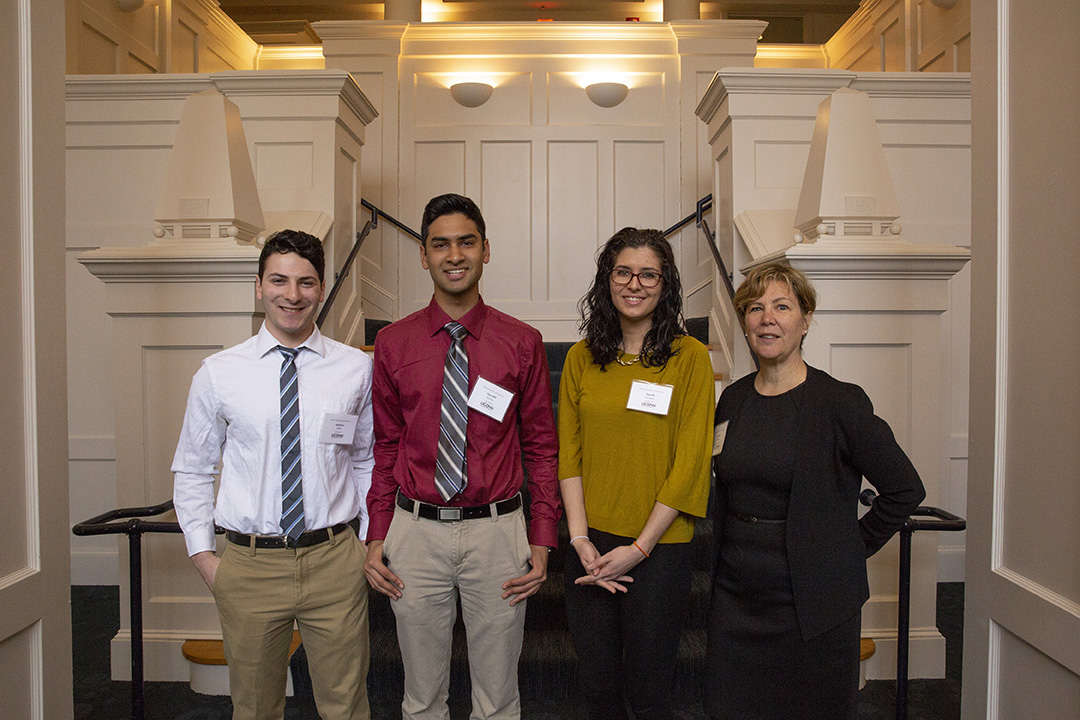
Meet UConn’s 2018 nominees for the Barry Goldwater Scholarship.
Sarah Ferrigno (CLAS ’19) is an Honors student from Montgomery, NJ double majoring in psychology and molecular and cell biology. She was nominated for the Goldwater Scholarship. After graduation, she intends to obtain a Ph.D. in Neuroscience in order to explore the neural mechanisms underlying mental illness and develop more effective treatment options. As a Holster scholar, Sarah spent the summer following her freshman year working under Dr. John Salamone investigating the role of the adenosine A2a receptor with regard to the motivational symptoms associated with major depressive disorder. Utilizing the novel drug Preladenant, an incredibly selective adenosine A2a receptor antagonist, she was successfully able to reverse an induced low-effort bias in a rodent behavioral model. Sarah’s work was presented at the 2017 Society for Neuroscience conference and is currently under review for publication. The summer following her sophomore year Sarah was one of twelve fellows selected from over 200 applicants to conduct research at the Center for Neuroscience at the University of Pittsburgh. While there, she worked under Dr. Michael Gold to understand the mechanisms behind chronic migraine by using fluorescent immunohistochemistry to analyze immune cell aggregation and neural innervation in human dura samples. Her recent work in the Salamone lab is focused on evaluating the mechanisms of effort bias mediated by the serotonin 1B receptor. Sarah was twice awarded the New England Scholar award for academic excellence, received Sophomore Honors, and was recently appointed as a University Scholar, UConn’s highest undergraduate honor. Outside of the lab and in her free time she is President of the UConn Psychology Club, is a big fan of music, and is currently learning guitar.
Saurabh Kumar (CLAS ’20) from North Andover, MA, is a STEM Scholar majoring in physiology & neurobiology and minoring in statistics. He is planning on pursuing an M.D./Ph.D. degree in Neurobiology to investigate effective therapies for his patients with central nervous system damage following injury and lesioning. His research career began the summer of 2015 in the Cao Lab at the University Of New England College Of Osteopathic Medicine where he investigated glial cell inflammatory responses to chronic morphine use in a rodent AIDS retrovirus infection model. This work was recently published in the Journal of Neuroimmunology. Currently, Saurabh is conducting research in the Conover Lab at UConn on the development of the brain’s lateral ventricles and the ventricular-subventricular zone (V-SVZ) stem cell niche. He is working to complete a spatiotemporal model of lateral ventricle and V-SVZ normal development that will allow future neural stem cell niche researchers to evaluate effectively, a given pathology against the normal phenotype. Saurabh received a 2018 SURF grant that he will use to study development of this stem cell niche in hydrocephalic patients and model quantitative hypotheses for mechanisms of ependymal cell differentiation along the brain’s ventricles based on prior cell counts. Outside of the laboratory, Saurabh is an online math tutor for K-12 students and an avid clarinetist serving as the Principal Clarinet player in both the UConn Symphonic Band and UConn Chamber Ensemble Club. He is also the Co-President of the KDSAP Club – an organization that provides free kidney health screenings to medically under-served populations.
Andrew Levin (ENG ’20) from Yorktown Heights, NY, is a STEM Scholar pursuing a B.S.E in Materials Science and Engineering (MSE) and minors in mathematics and physics. He plans to earn a Ph.D. after graduation in order to make an impact in the research and development of renewable energy technologies. His research journey began as a junior in high school as part of an intensive science research program. Through the program, he conducted two separate year-long research projects and was named an Intel STS Semifinalist. The research in those projects focused on designing solar tracking devices for photovoltaic application, which was a mechanical engineering approach for enhancing solar cell performance. At the beginning of fall freshman year, after seeing a guest lecturer speak of materials science research in photovoltaics at UConn, his interest was sparked. He began to work with Dr. Bryan Huey, where he learned a novel microscopy method unique to UConn, and how it could be applied to study the inner workings of solar cells. As a Holster scholar, he spent the summer after freshman year at UConn, where he applied his newfound microscopy experience to study a unique Cadmium Telluride (CdTe) solar cell sample. The results from the summer research shed important insights on charge transport throughout the microstructure of the CdTe. Andrew has since continued his study of CdTe cells as part of Dr. Huey’s lab group, where he performs experiments to determine the correlation between microstructure and solar cell efficiency. Outside of academics, Andrew enjoys hiking, climbing, and snowboarding.
Daniel Zeigher (ENG ‘19) from Trumbull, CT, is an Honors student pursuing a B.S.E. in Environmental Engineering. He is planning on earning a Ph.D. in Environmental Engineering and pursuing a position conducting interdisciplinary research at a leading research institution. Daniel currently works in the chemical engineering lab of Dr. Leslie Shor where he utilizes microfluidic devices for agricultural and biotechnological applications. He has worked with microfluidic devices that emulate the microstructure of soil to investigate protists’ ability to transport nano-encapsulated agrochemicals directly to plant roots. Daniel’s involvement began in the summer of 2017 with the investigation of the movement and feeding behaviors of the protist Colpoda steinii. His undergraduate research will culminate in 2019 with the completion of his honors thesis that he personally proposed. For this thesis he is currently developing an assay that will evaluate the interactions between soil protists and the potentially detrimental nanomaterials they ingest. Daniel has been recognized as a New England Scholar and received a UConn School of Engineering Scholarship Award. Outside of academics, he is involved in Alternative Break Trips through UConn’s Department of Community Outreach. These service projects have been focused on topics including coastal conservation in Groton, Connecticut and rural poverty in Cosby, Tennessee.